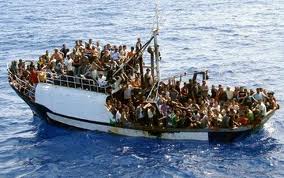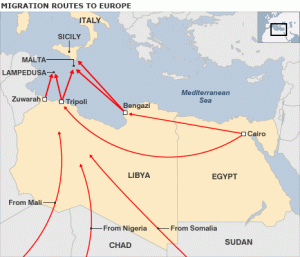The topic of Libyan refugees is one that is so large, so broad and so important that I haven’t known where exactly to begin with it even though it’s  something that is important to talk about. We’re talking about hundreds of thousands of Libyans have fled the country since the start of the conflict in early 2011. But, a news story I read today about migrants from Northern Africa, many Libyan, dying at sea while fleeing to Italy was just so sad and moving that it seemed like a good place to start.
something that is important to talk about. We’re talking about hundreds of thousands of Libyans have fled the country since the start of the conflict in early 2011. But, a news story I read today about migrants from Northern Africa, many Libyan, dying at sea while fleeing to Italy was just so sad and moving that it seemed like a good place to start.
What’s tragic about this story is that it is known that North Africans, especially Libyans and others fleeing areas of conflict, are escaping to European countries across the Mediterranean Sea. The UNHCR in 2011 reported that 50,000 Libyans fled across the Mediterranean with 2,000 reported dying en route. No doubt this number is in reality higher given the clandestine nature of fleeing a conflict country. This is not exactly something those fleeing go around keeping record of. Some of these migrants have been lucky and were rescued when they were in danger, but many others, like the ones in the news story, were not.
I’ve talked in a previous blog post about the burden refugees can pose for neighboring host countries. Receiving host countries don’t necessarily have the desire, resources or need to go around safely assisting migrants trying to enter their countries. But, what about international organizations (like UN agencies or NATO; especially those specifically concerned with refugees, migrants and human rights) patrolling the waters looking for people fleeing? Since this is known to happen, are they not out there looking for Libyans and others fleeing on shoddy little rubber or overcrowded boats? Well, kind of. This does happen to a certain extent; but sadly, there are multiple stories of boatloads of African migrants being ignored by those with the capacity to rescue them and instead they are left to die at sea.
I know it’s not feasible for one organization to solely be responsible for dedicating a significant amount of resources towards monitoring the waters where people migrate from conflict. In a perfect world it would be. But, I think there is a problem of responsibility and accountability that can be addressed. The collaboration between national coastguards and international organizations like NATO is already there, which is great. But, this could be strengthened. There must be protocol in place to rescue ‘boat people’ when they are spotted supported by international agreements and national policies. Perhaps coastguards could be responsible for coastal rescues whereas NATO could look over deeper waters? Commercial and personal fishing boats cannot be expected to rescue people, but they should be required to report contact with boats of migrants with the threat of fines put in place by national policies. Sightings reported to coastguards and international organizations must be followed through with threat of punishment as a means of accountability for failing to assist.
Help must also come before migrants set to sea. It would be great if once a conflict situation like Libya was recognized; international organizations stepped in when to protect civilians. In doing so, having assistance from international organizations in place to help people flee could help save thousands of lives. Additionally a framework must be set in place for handling organizational collaborations, a structured reception of migrants in host countries, and plans for integration and resettlement so as to allow them to build new lives. Collaborations with refugee organizations to assist in integration would also help in the follow up.
The peril facing Libyan and North African migrants is so dire and affects so many people, that it can be overwhelming and belittling to answer the question “What can I do?” Well, what you can’t do (unless you have a lot of time, money and nerves of steel) is go out searching for people to help in the Mediterranean. However, though you may be thousands of miles away from Libya or its neighboring countries, you can still have an impact. A quick Google search will bring up tons of information on how your donations can help (but always do your research on the credibility of an organization before you throw your support their way). If you don’t have the funds to help, keep seeking out news articles and blogs talking about these issues. Encourage international organizations to establish policies and frameworks on collaboration, ways to safely bring migrants to their destinations, and integration into receiving countries. Learn what’s happening. Share what you find with friends, family, etc. through emails and social media. Don’t let the plight of these refugees become back page news.



